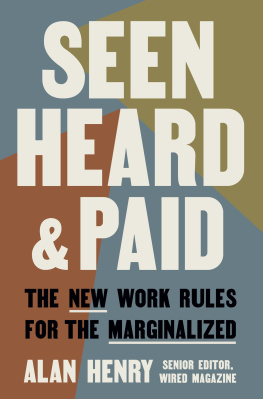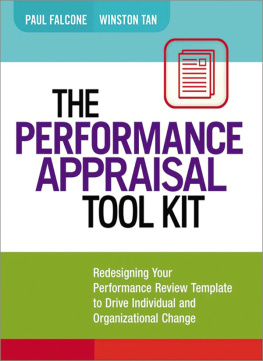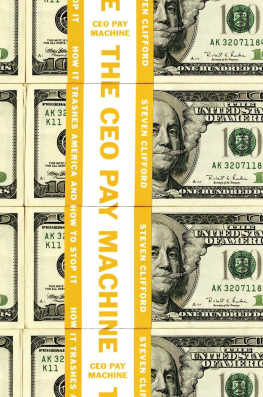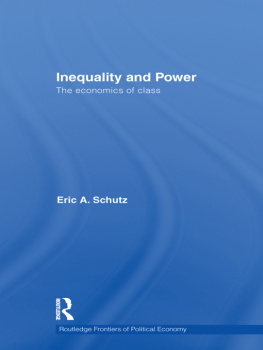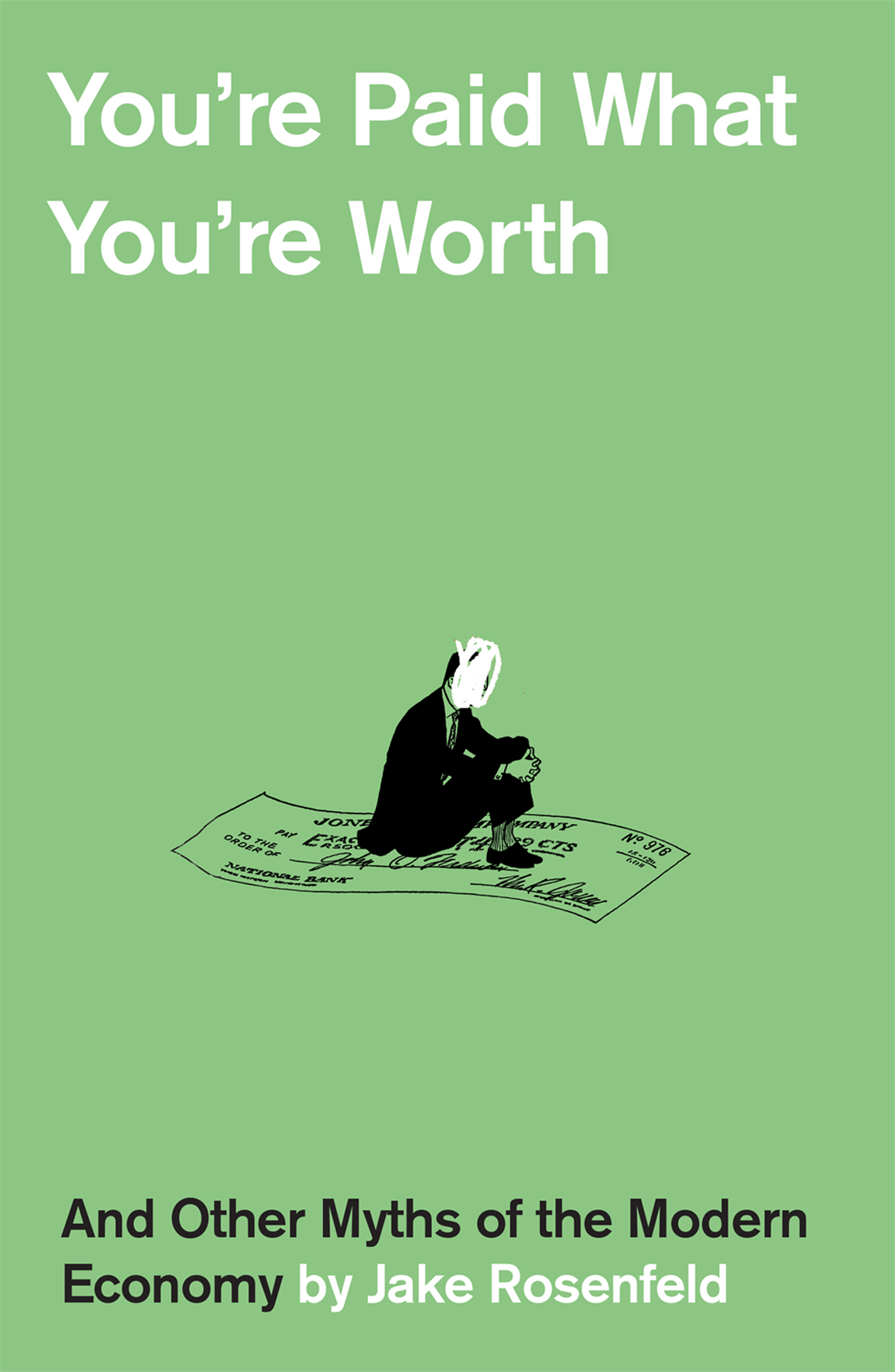Names: Rosenfeld, Jake, 1978 author.
Title: Youre paid what youre worth : and other myths of the modern economy / Jake Rosenfeld.
Description: Cambridge, Massachusetts : The Belknap Press of Harvard University Press, 2021. | Includes bibliographical references and index.
Subjects: LCSH: Pay equity. | Equality. | Performance standards. | Wages and labor productivity. | Merit pay.
UNITED AIRLINES EIGHTY THOUSAND EMPLOYEES earned extra pay when the company met certain performance targets, such as besting rivals in on-time departures and lost luggage rates. In March of 2018, the company decided to scrap its incentive plan and replace it with a lottery that awarded cash prizes, vacation packages, and fancy cars to lucky employees chosen at random. Reaction from the workforce was swift and unambiguous. An internal company forum exploded with comments blasting the change. One worker posted: This is NOT a way to boost morale! It does quite the opposite. I wonder what kind of bonus was given to those in the big tower who came up with this nonsense.
Wells Fargo also had a long-standing incentive plan in place for its tellers and personal bankers. A portion of pay depended on performance goals, with performance defined largely by the number of accounts a worker persuaded customers to open with the colossal San Francisco-based bank. The incentive system worked extremely well: in 2013, Wells Fargos retail customer households held an average of six of the banks products (for example, IRAs, CDs, savings accounts, credit cards), far higher than the industry norm.
Who gets what and why? has preoccupied workers, employers, and those of us who study them for centuries. Debates about increasing inequality, stratospheric executive pay, and minimum-wage legislation dominate contemporary economic discourse among experts and policymakers. A rising level of worker activism, from the Fight for $15 among fast-food and retail workers to the teacher strikes that roiled one state after another in the spring of 2018, demonstrate grassroots attention to the crucial issue of pay-setting in our economy. Yet traditional explanations of what determines our pay, both commonsense and academic, focus on impersonal market forces or intrinsic characteristics of our jobs. These answers to the question of who gets what and why are empirically inadequate and increasingly unhelpful as guideposts toward a fairer future.
In 2013, President Obama proclaimed: I believe this is the defining challenge of our time: Making sure our economy works for every working American. As we enter the 2020s, the challenge remains urgent. A future in which the economy works for all requires an accurate understanding of how todays economy actually works. This book provides an important part of that by offering a perspective on pay-setting grounded in the day-to-day, routine actions of people in organizations.
In our organizationswhether large, multinational firms, government agencies, or tiny nonprofitswe negotiate over the appropriate distribution of organizational revenue. We stake claims, sometimes explicitly, often implicitly, on a slice of the organizations pie. We make these claims based on a set of available resources, and other actors within and beyond the organization validate certain sets of these claims over others. These negotiations dont occur in a vacuum, and the resources that we bring to them arent predetermined. They are dynamically shaped by four key elements: power, inertia, mimicry, and equity. Together, these channel our efforts to receive a greater share of our organizations revenue.
This account of pay-setting is rooted in organizationswith all their power dynamics and established habits, tendencies toward imitation, and equity concerns of people within themand recognizes the many peculiarities and paradoxes we see in real-world wage disparities. Most important, it provides a pathway to a more equitable future. Why do construction workers today earn about $10,000 less per year than they did in the 1970s? Why does a Burger King worker in Denmark earn over twice as much as one in the United States? What happened to the so-called good jobs we have heard about in every campaign season? How have we ended up with levels of economic inequality at heights unscaled since the Gilded Age? How should a company define performance, and how much of workers pay should be tied to it? The account of pay-setting this book provides answers to these questions, and many more.
POWER, INERTIA, MIMICRY, AND EQUITY
Power is the ability to get ones way even in the face of opposition. All wage and salary determination involves the exercise of power and represents the outcome of past and sometimes ongoing power struggles. Power has the force to settle claims made in organizations over slices of the pie. We marshal our available resources to augment our power in wage and salary negotiations. The old Joe Hill song and labor rallying cry, There is Power in a Union, gets at something fundamental about our workplaces: unequal power relationships. Cheery bromides about the bosss open-door policy or Walmarts associate label for every worker in the company cant mask a truth about the hierarchical bureaucracies in which most paycheck-drawing Americans work: some people in the building have a greater ability to get their way than others, including their way with the organizations revenue.
Power comes in various forms. Coercive power is at work when, despite a bone-deep belief that youre being underpaid, you dont openly question your salary because your boss is a vindictive tyrant who punishes any dissent. You may consent to your pay level by not explicitly challenging it, but you certainly dont believe its legitimate. But when you accept your salary based on trust that your boss has your interests and those of the broader organization in mindthats legitimate power. Power in workplaces becomes legitimated when those who are subject to it give it their consent. Lack of overt conflict does not imply, therefore, that power is absent. Indeed, the ability to instill in others a belief that the organizations pay structure makes sense is a core component of legitimate power.Legitimate power is an essential feature of modern workplaces, at least healthy ones, allowing us to go about our working day without being consumed with frustration or spite, or planning reprisals against our supervisors.
Over time, as power struggles play out, and especially as the outcomes are widely viewed as legitimate, inertia sets inthe second basic element underlying pay-setting. Organizational inertia is a well-documented general phenomenon. Specifically with regard to pay, it is the tendency for a compensation rate associated with a given job to persist over time. For many of us, the overt, conflictual battles over pay occurred prior to our arrival at our workplace. Upon hire, we were either told exactly what we would be making or offered some small room to negotiate. This is inertia, a property of workplaces where claims made and validated in the pastbefore you ever started the jobdetermine what your job pays. Here, pay attached to particular jobs assumes a taken-for-granted-ness, a sense that, say, the $22 per hour offered for a starting line mechanic is a legitimate wage for that particular job. Youre paid what youre paid because your organization has decided thats what your job gets. Inertia doesnt mean that ongoing power dynamics are absent, just that the overt claims-making process has been temporarily settled. When workers start to believe pay levels for various jobs are just common sense, and make no explicit claims to change them, thats legitimated power helping to quell any calls for a greater share of organizational revenue. Inertia sets in, we go about our daily business, taking for granted that the numbers on our paycheck and a coworkers in the nearby cubicle make some sense.



